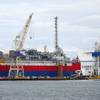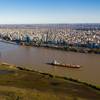South Sudan Awards Two Mineral Exploration Licences
South Sudan has awarded provisional licences to two companies for mineral exploration as it attempts to diversify the economy away from oil, a government official told Reuters on Tuesday.
South Sudan is rich in gold and also probably has reserves of other minerals such as copper, uranium and clay which it hopes to exploit with the help of investors.
Arkangelo Okwang Oler, the director of mining in the national ministry of petroleum and mining, said the licences were awarded to South African firm New Kush and Equator Gold, whose parent company is incorporated in Jersey.
The country, one of the world's least developed countries after decades of civil war and which seceded from Sudan in 2011, wants to attract mining investment to kickstart development.
The world's newest country narrowly avoided civil war when troops loyal to sacked Vice President Riek Machar rose up against the government of President Salva Kiir in mid-December.
Juba is also trying to diversify the economy away from oil which used to make up 98 percent of the budget until South Sudan shut down its output of 350,000 barrels per day a year ago during a row with Sudan over export fees.
Eastern Equatoria is believed to contain commercially viable mineral deposits of gold and limestone.
"There are a lot of minerals in Eastern Equatoria," Oler told Reuters. "You get gold, limestone and you may also get other associated minerals like silver," he said.
South Sudan's parliament passed a bill in 2012 that ended a moratorium on mining since 2010.
Oler said New Kush is destined for its first exploration drilling in two weeks in Nadapal in Eastern Equatoria state.
"When the drilling rigs come, possibly in a week or two to Nadapal, drilling commencement will kick off. We feel we needed to confirm the 'commerciality' of the deposits by the two companies," he said.
South Sudan is still trying to map out its resources, a difficult task in a country the size of France where only 300 km (190 miles) of paved roads exist.
"We are still working, our block system has not been approved. We are grading the country into squares of 50x 50 km squares for a maximum exploration block," he said.
(By Carl Odera; Writing by James Macharia, editing by David Evans)












